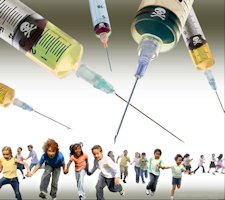
|
Some Common Myths Thought to be True - Myth 82
Myth 82: Vaccines Cause Autism Disorders
The Centers for Disease Control and Prevention (CDC), the Institute of
Medicine, World Health Organization, American Academy of Family Physicians, and
American Academy of Pediatrics strongly endorse vaccines as a safe, effective,
and critical preventive measure against diseases that can be serious, and even
deadly.
|
| Vaccines | |
|
The decision not to vaccinate places their children at risk for
vaccine-preventable diseases and increases the risk of disease outbreaks.
Recent legal rulings and a formal retraction of the study that first posited a
link between autism and vaccines add to a
strong body of evidence that vaccines do not cause autism.
|
|
| ⇦ Back to Myth 81 Return to Myth Choices Page 6 On to Myth 83 ⇨ | |